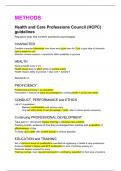Summary
clinical psychology methods summary
- Module
- Unit 5 - Clinical psychology
- Institution
- PEARSON (PEARSON)
coincise summary of methods in clinical psychology including: - HCPC guidelines -grounded theory - types of studies -interview example -case study key points highlighted
[Show more]



